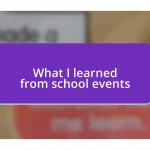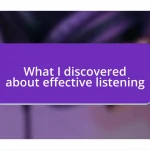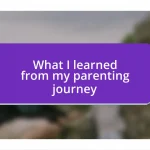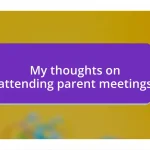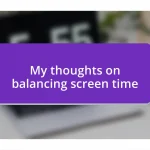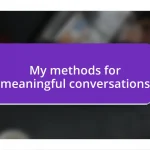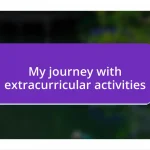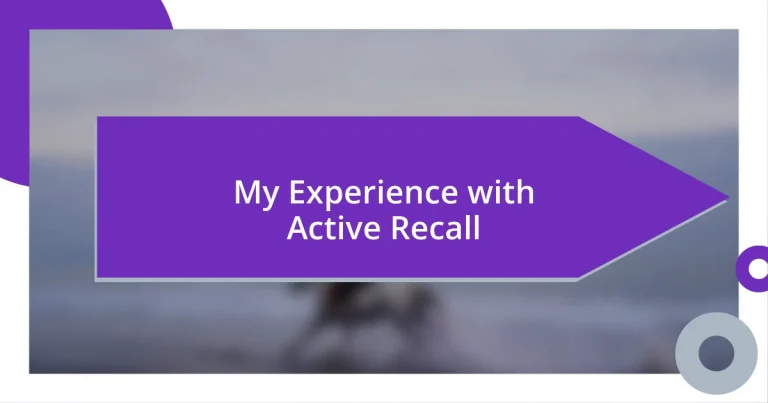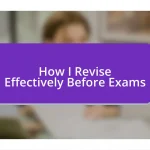Key takeaways:
- Active recall solidified memory retention and understanding, transforming studying from a passive to an engaging experience through techniques like flashcards and self-quizzing.
- Challenges included initial anxiety, maintaining consistency, and dealing with frustration during recall attempts, which ultimately fostered resilience and shifted focus to long-term learning progress.
- Measuring success through journaling and tracking performance helped refine study techniques and foster a positive relationship with learning, emphasizing both emotional highs and comprehension over mere facts retained.
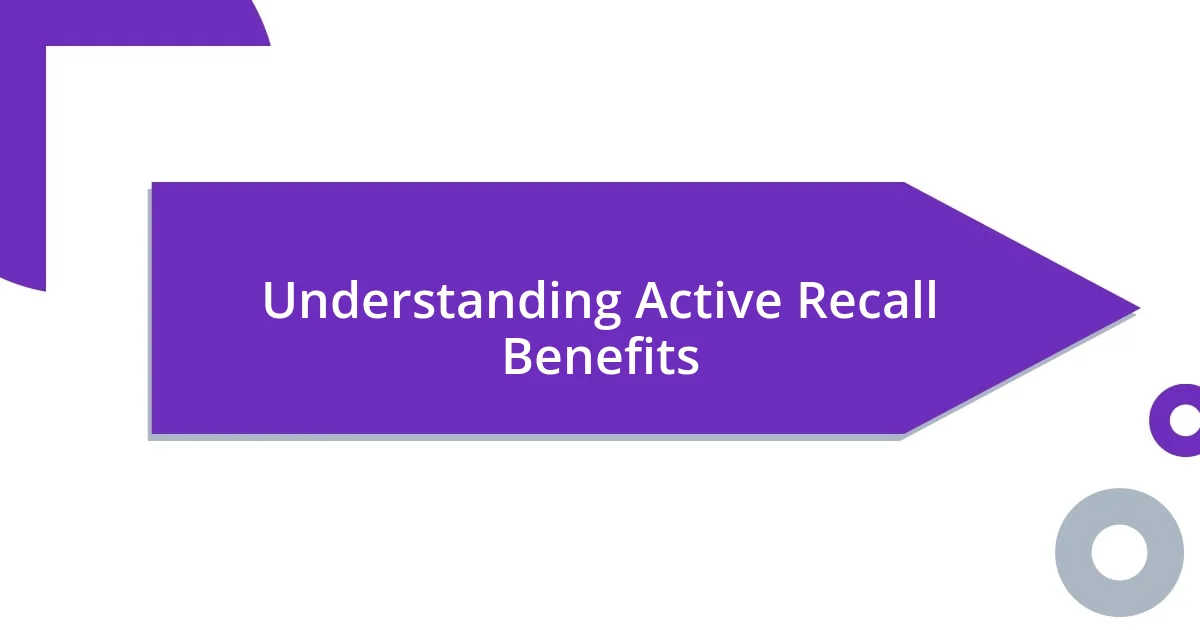
Understanding Active Recall Benefits
One of the greatest benefits of active recall that I’ve experienced is its ability to solidify information in my memory. Remember the last time you crammed for a test? I used to panic just before finals, only to forget most of what I studied days later. With active recall, I found that repeatedly testing myself on the material allowed me to not only retain information longer but also understand it at a deeper level.
I vividly recall a time when I was preparing for a big exam. Rather than passively rereading my notes, I took a stack of flashcards and quizzed myself relentlessly. What surprised me was how much more confident I felt going into the exam—almost as if I had already done it. Have you ever felt that rush of adrenaline when you recall something you thought you’d forgotten? It’s addictive!
Another plus of active recall is its efficiency. I used to spend hours poring over textbooks, but now I spend shorter, focused sessions actively recalling the content. This not only saves time but also leaves me energized rather than drained. Why not try it for yourself? I’ve seen firsthand how this method boosts retention and transforms studying from a chore into an engaging challenge.
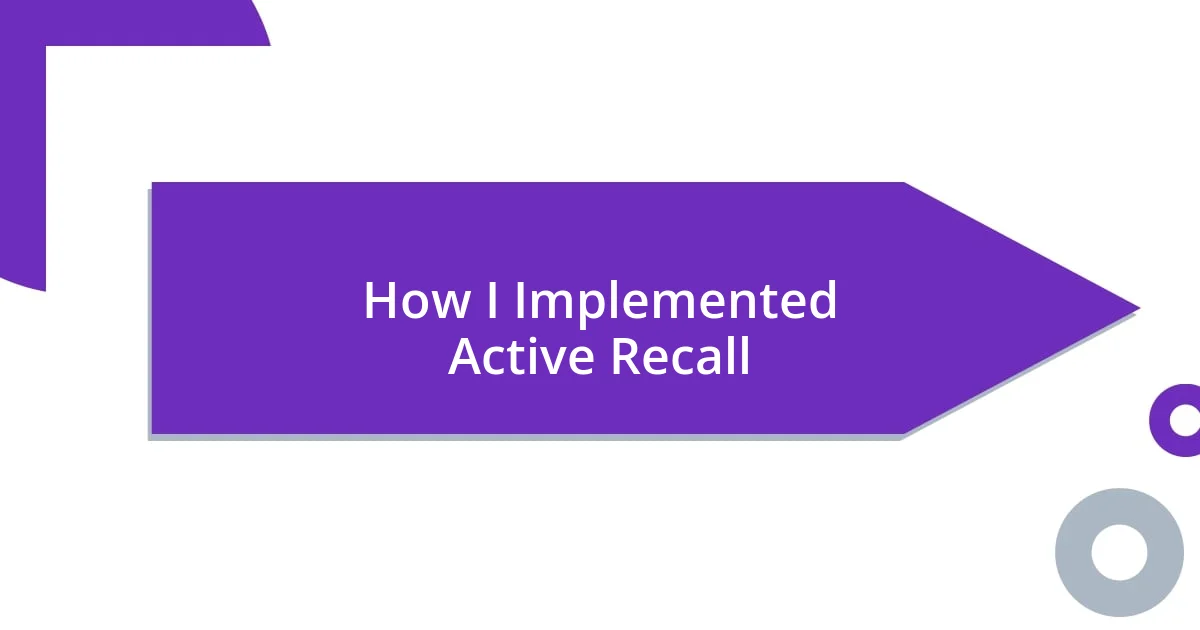
How I Implemented Active Recall
Implementing active recall transformed my study habits in ways I hadn’t anticipated. I started by replacing my traditional review sessions with self-quizzing methods. It was a bit nerve-wracking at first; I felt like I was putting myself on the spot. However, I quickly realized that the moments of panic as I searched for answers were exactly what solidified the knowledge in my mind.
Here’s how I incorporated active recall into my routine:
- Flashcards: I created flashcards for key concepts. The act of flipping them and recalling the answers kept me engaged.
- Quiz Apps: I utilized several online quiz apps that allowed me to test myself anytime. The convenience made it easier to integrate into my daily schedule.
- Revision Sessions: I would have “revision dates” with friends where we quizzed each other. It introduced a fun, competitive edge to studying.
- Voice Notes: I recorded myself explaining topics aloud, which I replayed later to see how much I retained. This auditory element surprised me with its effectiveness.
Each of these strategies made the learning process feel less daunting and more like an adventure in knowledge rather than a race against the clock. I remember the thrill of recalling information with little effort, which motivated me to dive deeper into my subjects.
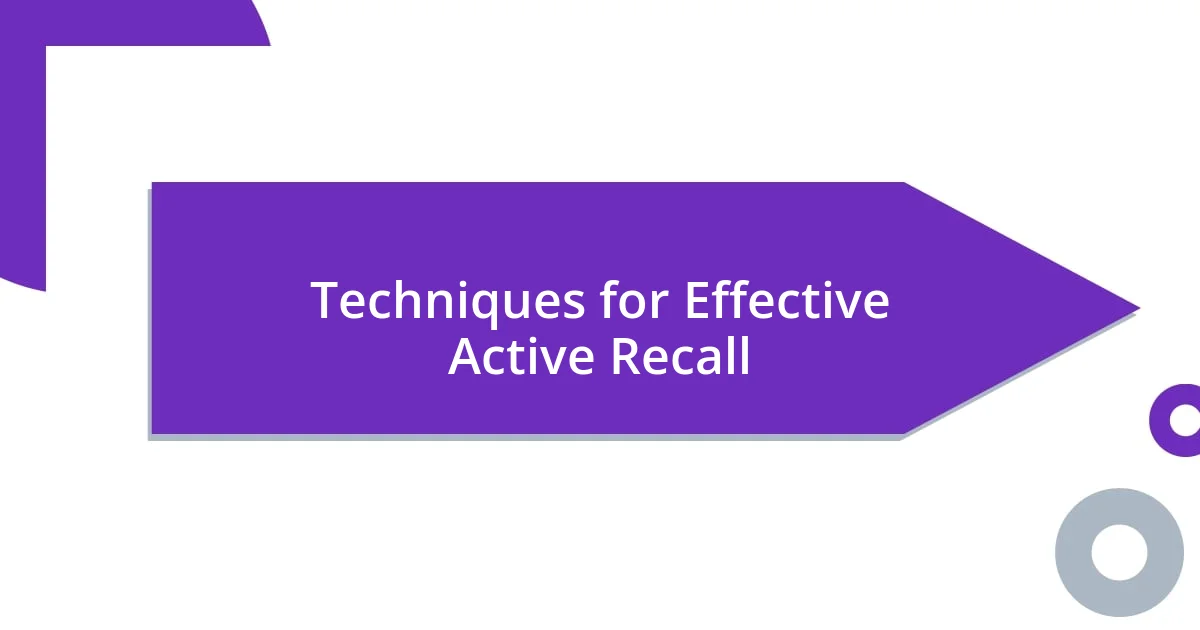
Techniques for Effective Active Recall
Techniques for Effective Active Recall
One technique that truly changed the game for me was the use of flashcards. Initially, I thought they were a bit old-fashioned, but there’s something powerful about the tactile experience of flipping through cards. I remember feeling a surge of satisfaction as I flipped a card, recalled the answer effortlessly, and then rewarded myself with a little internal cheer. It made me look forward to studying rather than dreading the time I’d have to spend going back over notes.
Another method I embraced was teaching the material to someone else. Have you ever noticed how your understanding of a subject deepens when you explain it? I found that not only did I reinforce my recall, but the exchange of questions and discussions with friends brought concepts to life. There were moments of frustration, yes, especially when I struggled to articulate certain ideas, but that struggle led to clarity and helped solidify my grasp on the subject matter.
I also discovered the value of spaced repetition. Instead of cramming everything at once, I spaced out my reviewing over days and weeks. It felt counterintuitive at first; why would I wait to revisit information? But when I finally faced it again after a short break, I was amazed at how much more readily I could access my knowledge. That’s when I understood—this wasn’t just studying; it was a dynamic dance between forgetting and remembering that made the knowledge stick.
| Technique | Description |
|---|---|
| Flashcards | Engaging and tactile, allowing for self-quizzing and instant feedback. |
| Peer Teaching | Explaining concepts to others enhances understanding and retention. |
| Spaced Repetition | Review material over time, reinforcing memory and connection. |
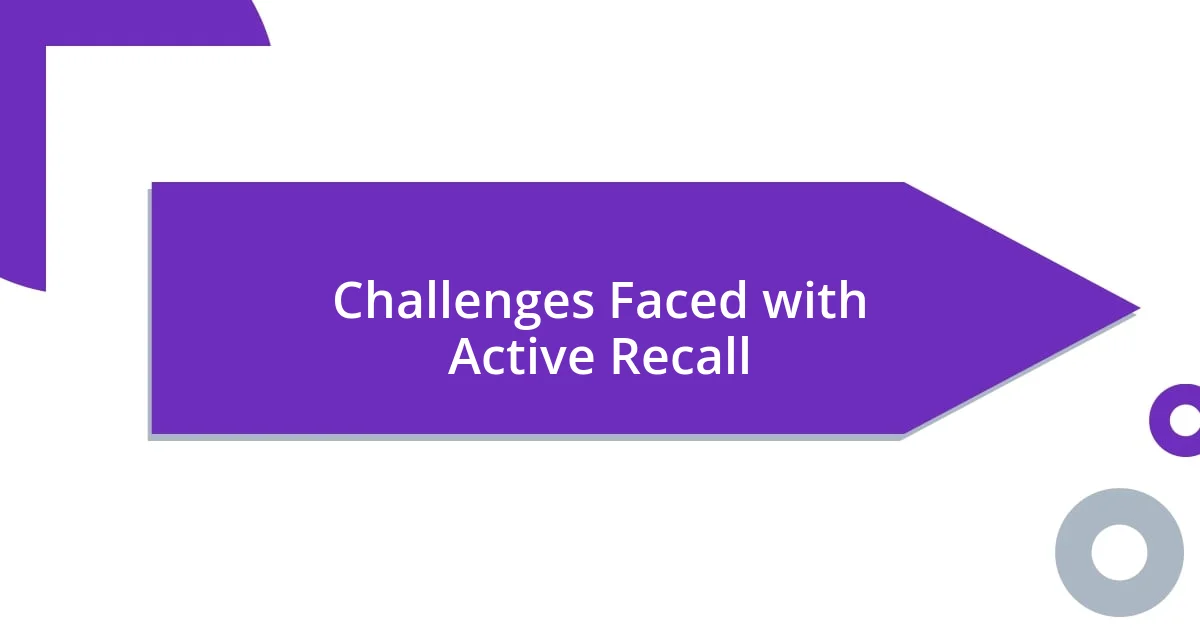
Challenges Faced with Active Recall
One of the biggest hurdles I faced with active recall was the initial discomfort of putting myself under pressure. I remember sitting down with my flashcards and feeling a wave of anxiety wash over me as I tried to summon the right answer. It’s a challenge I suspect many encounter; the fear of not knowing can sometimes overwhelm the excitement of learning. But over time, I understood that this discomfort was a part of the process, a signal that I was pushing my boundaries and actually retaining information.
Another challenge I encountered was ensuring consistency. There were days when life got in the way, and I would skip my active recall sessions. Ever had one of those moments where you rationalize missing a study session because you’re just too tired? I completely relate! Yet, those missed sessions used to haunt me later when I’d struggle to remember what I learned. I found that setting specific times in my calendar made a significant difference, helping me build that habit sustainably.
Lastly, sometimes my recall attempts felt futile when I couldn’t retrieve information as quickly as I wanted. It was frustrating to feel like I was backpedaling rather than progressing. Have you ever felt like you were just spinning your wheels? In moments like these, I learned to shift my focus from immediate results to the bigger picture—acknowledging that every struggle was, in fact, a stepping stone toward mastery. Each challenge taught me resilience, reminding me that learning is not a sprint but a journey filled with ups and downs.
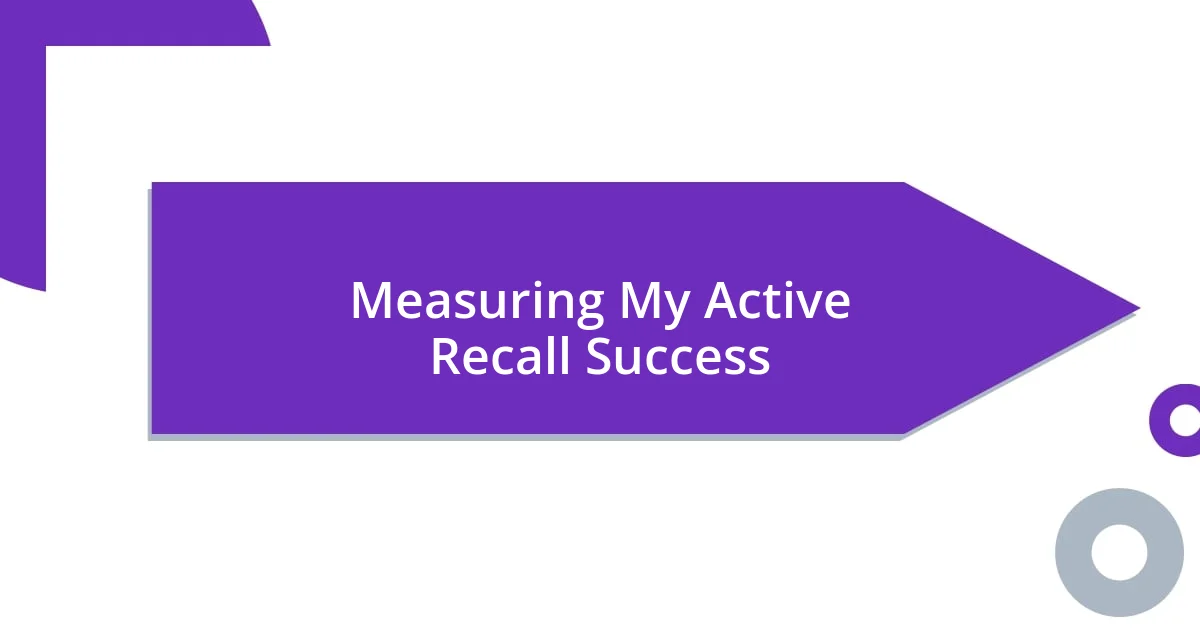
Measuring My Active Recall Success
To measure my active recall success, I started keeping a small journal where I would write down the topics I reviewed and my performance on each recall session. At first, I was surprised by how often I couldn’t retrieve information. It felt discouraging, but that realization pushed me to fine-tune my approach. I began noting the techniques that worked best for me, which allowed me to focus on my strengths and strategically improve my weaker areas.
I found that tracking my progress in terms of accuracy and confidence made a significant difference. I began marking each session with a simple scale from one to five, reflecting my recall ability. The first time I hit a five, I could hardly contain my excitement—it felt like winning a mini-battle! That small achievement motivated me to push further, leading to deeper engagement with the material. It was a beautiful reminder that even small victories contribute to larger learning journeys.
On reflection, I realized that measuring success isn’t just about numbers; it’s also about how I felt along the way. Have you ever had those moments where you couldn’t remember a key detail, and then suddenly, it clicked? Moments like these were worth celebrating! They reminded me that learning is a process, and the emotional highs and lows are just as important as the facts retained. By embracing this journey, I developed a healthier relationship with my studies, ultimately leading to a more profound understanding of the material.
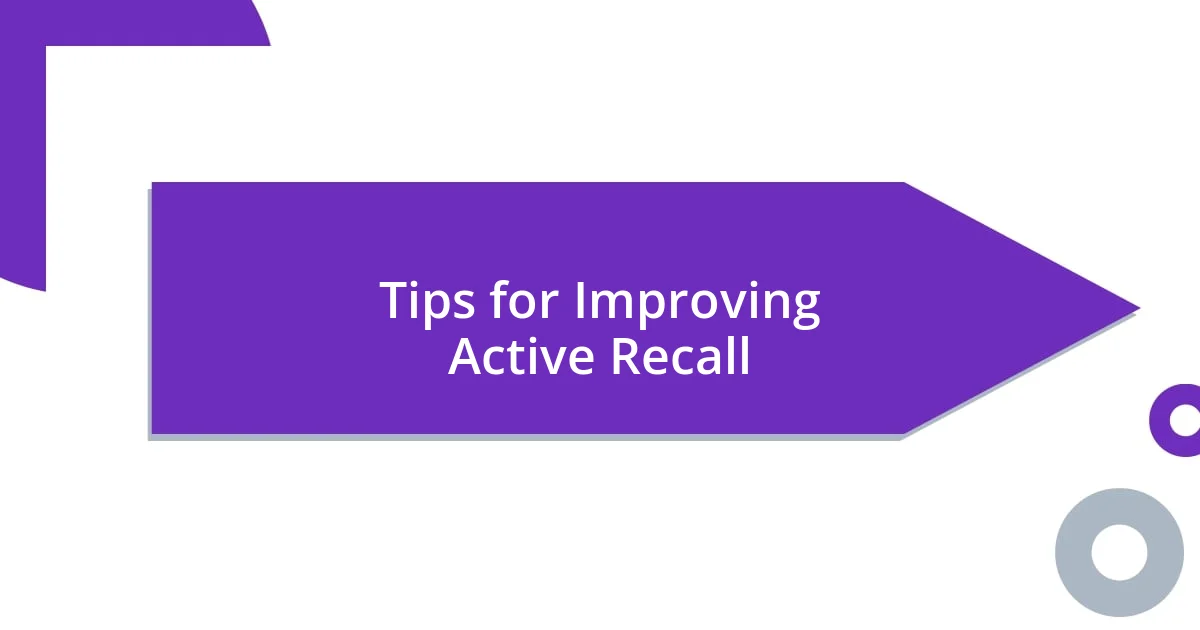
Tips for Improving Active Recall
To enhance my active recall sessions, I realized the importance of varying my study materials. Last semester, I combined flashcards with practice quizzes and summaries, which transformed my reviewing experience. Have you ever noticed how shifting between different formats makes the content more engaging? It certainly worked for me, as it kept my brain on its toes, preventing monotony and ensuring better retention.
Another strategy that proved effective was incorporating spaced repetition into my routine. Instead of cramming everything at once, I spaced out my review sessions. Initially, I thought I could conquer it all in one sitting, but that approach only led to frustration and minimal recall. By revisiting topics over increasing intervals, I found that my ability to remember information significantly improved. It’s fascinating how our brains thrive on repetition, isn’t it?
Of course, staying motivated throughout the process is crucial. I began rewarding myself after completing sessions—whether it was treating myself to a TV episode or enjoying a favorite snack. Have you tried using rewards to incentivize your learning? I discovered that these small incentives motivated me to push through, even on days when my energy waned. Building this sense of accomplishment reminded me that learning can be both effective and enjoyable, paving the way for long-term success.


